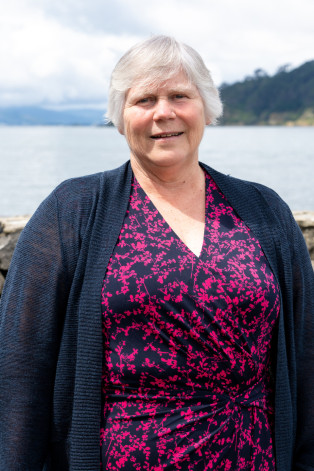Posted on 10 February 2023
Te Au o Te Moana - Voice of the Ocean: Julie Hall
- News
- 3 Minutes to read
Julie Hall loves a storm.
“I love being on the beach when there's lots of wind and the waves are crashing. It makes you respect nature.
Julie, the director of the Sustainable Seas National Science Challenge, has always had a deep connection to the moana.
“It’s that wild open space. For me, nothing is better than walking on a beach with no people, and no footprints.”

Growing up in Southland, she and her family spent a lot of time going to different beaches, swimming, and exploring rocky shores.
“My dad used to say if he had a dollar for every rock he'd turned over for me to look what was underneath it, he'd have been a rich man.”
As a teenager passionate about ecology and the environment, Julie had a choice to make about how to put that passion into action, either through activism or science that would support good environmental management.
Julie chose science, and that passion led her to becoming the Challenge Director, a role she says lets her work within an organisation that’s making a difference.
The job brings together Julie’s experience with science and management together, after a career shaped, she says, by the opportunities she was given.
“In my sixth form year I did a project on water quality of Waihopai river in Invercargill, and I won a Royal Society Prize, which supported me to have two weeks working in a research institution.
“I went to a DSIR lab in Taupo, which took me into freshwater in the lakes up there. I then spent a summer working for them around the lakes and rivers in central North Island, so that pushed me into freshwater.”
Julie went on to study zoology, and completed a PhD at University of Manitoba in Canada.
It wasn’t until she came home to New Zealand that she went back to the marine space that had sparked such curiosity in her childhood.
“I got a postdoctoral fellowship, and they needed someone to work on marine picophytoplankton, which is very tiny algae.
“So sometimes it’s not a planned path, but that opportunities have opened up.”
Hidden problems
Working with the moana means Julie is aware of the stress it is under, but she says many New Zealanders aren’t.
“People don’t see the effects we’re having on the ocean; they see the blue water, but they don’t necessarily see below it. I don’t think there’s a broad understanding of how damaging our actions are on the marine environment.”
One of the biggest challenges when it comes to righting that is managing what’s happening on land.
“Some of our practices in the ocean are not great, but sediments, nutrients, plastic – a lot of it comes from land.”
But what makes her role at Sustainable Seas so satisfying is knowing that the organisation is charged with doing research that has a direct impact.
“I can see where we are influencing practice - working with regional councils in the way they're managing the marine environment and making the research accessible so that it can be used in decision-making.
The organisation is also being heard when it comes to policy and legislation – for example through submissions on the resource management act reform.
Feeding the research and the knowledge from Sustainable Seas’ mahi into informing such policy and legislation is critical, Julie says.
“The Challenge is making a difference, seeing that – now that’s what makes it exciting.”